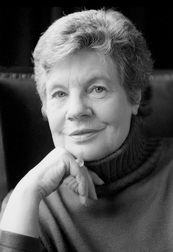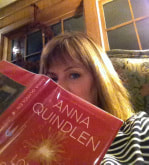 A.S. Byatt on writing historical fiction In 2002, Jonathan Walker interviewed A.S. Byatt and Lawrence Norfolk at the University of Cambridge. Walker saw this as an opportunity to learn from these two authors. Booker Prize winner, A.S. Byatt is a hugely successful British author and one of Book Club Extraordinaire’s favorites. Here are some highlights from Walker’s interview. A.S. Byatt didn’t begin reading history until she was fifty-five. She admits her education was “narrow.” She had never studied the political history of Europe. This tidbit surprised by me having read The Children’s Book last year. I am so glad she changed her mind about studying history. She was intrigued with writing historical fiction by the appearance of an increasing number of fictional works “interested in what historians felt they could not say, because it was not proper to say, and because they didn’t know. “ Also the idea “in which the imagination persists in filling out what you have not been told.” It is these gaps and spaces that she finds quite exciting. When she is researching for a novel, she doesn’t want to read other novelist’s accounts of the time period. She wants to read: “endless diaries and boring biographies, minor autobiographies and little bits of newspapers.” It is then she can use her imagination. When writing about dead characters, she believes you owe them some respect. You must tread lightly. When writing about the real Emily Tennyson, for Angels and Insects (1992) Byatt wanted to be fair to her. “I had read all the published letters I could get hold of, which were not many. So I had an idea of the real woman’s tone of voice, which was a mixture of overly romantic and very dryly comic, which I rather liked.” She let her imagination fantasy about the facts. She used Tennyson’s voice to splice the imaginary woman with the real woman. “When I think about writing, I think about it as telling the world to yourself. And I think that, as I’ve gotten better at writing, I’ve increasingly turned my world through a kaleidoscope of different ways of telling.” An Interview with A.S. Byatt and Lawrence Norfolk, Jonathan Walker, Contemporary Literature, Vol. 47, No. 3, Autumn 2006
0 Comments
Peter Fritz from Everyday E-book blog in this post titled "What is Normal? The Question Behind Richard Ford's Canada" writes: Underlying themes of family, maturity, relationships, and secrecy swim just below the surface of the story. And perhaps it is there we learn the deeper values of our ongoing but ever-adjusting sense of "normal" in our lives. The Quivering Pen gives books away on Freebie Fridays. Put FRIDAY FREEBIE in the e-mail subject line. One entry per person, please. Despite its name, the Friday Freebie runs all week long and remains open to entries until midnight on Thursday—at which time he draws the winning name. The lucky winner is announced on Friday. Last week it was Canada by Richard Ford and The Tell by Hester Kaplan. David Abrams writes about those memorable first two lines in Canada "First, I'll tell about the robbery our parents committed. Then about the murders, which happened later." Those words set the tone for the rest of the novel which Colm Toibin says is "a brilliant and engrossing portrait of a fragile American family and the fragile consciousness of a teenage boy. "The vast, empty prairie lands of Montana and Canada come alive in Richard Ford's latest work,Canada," Nicole Rojas writes for Latinos Post blog.I agree with her, Richard Ford's writing style does paint a vivid picture. Dell's mother describes Great Falls, "It's just cows and wheat out here." Dell said, "And, of course, the winters were frozen and tireless, and the wind hurtled down out of the north like a freight train, and the loss of light would've made anybody demoralized, even the most optimistic souls."
What an idea! Alli's Book Bar pairs Books with Booze. They are reading The Light Between Oceans for January, too. The drink paired with The Light Between Oceans is a Dark and Stormy. Alli writes, "I pictured a drink that would go well with sailing ships and the light from the lighthouse signaling the rocky shore."
I have a bottle of Gosling's Black Seal Rum in the pantry. What do you think, ladies? Dark and Stormy
Jennifer K Blog writes that she was drawn to The Light Between Oceans because of the moral dilemma at the book's core. Read her blog post for the book. Also, check out her favorite books read in 2012.
Kelly's [Former] France Blog reviews The Light Between Oceans. She writes, "This is one of my favorite books of the year. Hands down." One of her favorite lines from the book is found on page 71: "There are times when the ocean is not the ocean-not blue, not even water, but some violent explosion of energy and danger: ferocity on a scale only gods can summon. It hurls itself at the island, sending spray right over the top of the lighthouse, biting pieces off the cliff. And the sound is a roaring of a beast whose anger knows no limits. Those are the nights the light is needed most." La Bibliofille had the same issues I had of not giving away too many details when trying to review this book. She found it interesting to read about life on a remote island. I agree, one of the best things about the book is how well the author is able to put you on Janus Rock! Read more from Alice McNamara's blog. I'd like to recommend Books on the Nightstand blog. It is written by Ann Kingman and Michael Kindness, two lifelong readers who work in the publishing industry. They have put together a terrific resource for readers. Books on the Nightstand provides book recommendations, and a behind-the-scenes look at the world of books. They offer frequent blog posts, weekly podcasts and a yearly reader retreat. On there most recent podcast, they talks about Better Book Titles, Coverspy, and Bookrageous all on Tumblr. They share the books they want to read and what they can't wait for you to read.
Student, writer, blogger, and editorial intern at Milkweed Editions, Ann Mayhew has an ambitious summer reading list like most of us.Check out her website readingthroughcollege for a fun post on Jonathan Franzen's Freedom called Freedom to Choose our Great Novels.
|

Kathy Corey
I'm an expert amateur or maybe an amateur expert. Archives
May 2021
Categories
All
|
 RSS Feed
RSS Feed
